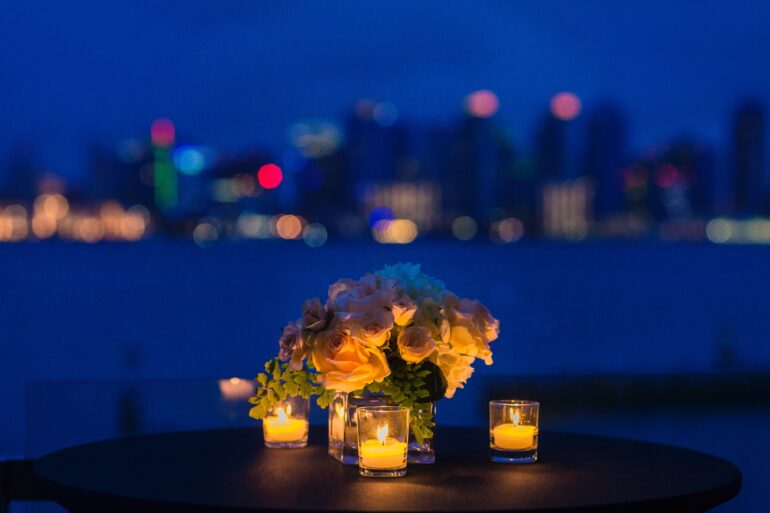Jessika Bouvier
There was a rumor that The Call would change everything. We waited in the line for the communal shower with our ears turned upward. We hovered in the kitchen-lobby-living room of our dormitory, chewing our catered lunches shamefully, like prisoners, or mice, or very mousy prisoners. We itched for the whine of the intercom, but The Call only came if we were alone.
We were in the third week of filming when the disappearances began. There were us, the men, and supposedly somewhere nearby, women. The producers pinned tiny mics to our collars and asked penetrating questions with a camera lens pushed in close. They were matching us for compatibility with the women. If The Call came, it meant we were matched, or something. We would leave the compound for some place glamorous and unspecific. We would meet our wives and have the awkward newness of our marriage broadcasted nationally. Viewers would vote for their favorite, or perhaps their least favorite, it was all a little unclear, but there was the promise of money at the end, a great amount of money, and these were desperate times.
We understood The Call meant you were chosen; it took Drake, Blaine, Alfred, Rodrigo. When it did, we thought, of course, this makes perfect sense, they are beautiful and gregarious men, very charming, the producers would naturally select the best of us and they were undisputedly that.
Then The Call came for Marcus. We were puzzled but ultimately accepting, although Marcus was a six out of ten even in direct natural sunlight and not particularly funny. They returned him less than a week later, shivering and pale with red-rimmed eyes. A solemn communal understanding formed: Marcus had been swathed in the bright silk of the chosen only to be returned, burdened forever with the knowledge that there was a better place out there, a place just beyond his reach. The producers cleaned up the body very quickly. There was barely any time to mourn Marcus before we were hunkered together again, glancing at the intercom, quaking with anticipation.
The Call came for me as I was crocheting on the toilet.
“Gregory,” boomed the voice, cloaked in layers of synthesizer. “This is The Call,” it said, which I thought was very unimaginative. The door tenderly unlocked, revealing producers on the other side. They carried me through the hallway, hoisted above their heads like a sacrifice. The koozie I was crocheting dangled from my hands like an unspooled doll. I was deposited in a bleak kitchen with gray walls and matching tile. In the corner, a printer glinted in the fluorescence.
“Thank you for coming,” the printer said. It wasn’t the printer, really, but a speaker hidden behind the printer, a frazzled wire jutting out the side. The producers stood around the printer like secret agents. Their heads were bowed in reverence.
“We have been monitoring you and felt it was important to inform you of our findings.”
“Have I been matched?” I asked, licking my chapped lips.
“The news is disconcerting. I’m sorry to say this to you, but the data has disqualified you.”
“What does that mean?”
“Well, Gregory,” and here there was a shared look of nervousness among the producers. The voice sighed in its warbled, synthesized accent, “The data is almost never wrong. It has suggested to us that you are a homosexual.”
The atmosphere morphed into a stiffness akin to funerals. I blinked and collected my koozie on my lap.
“Is that a problem?” I asked.
The voice paused. “I’m sorry?”
“I’m just unclear on what’s happening here. The data said I’m gay, and so? What now? I’m out of the running?”
“The data matches men and women.”
“Right.”
“So you would walk out of here with a wife.”
“Yes?”
The voice paused again, stretching the silence a little longer. “What?”
“Am I not handsome enough?” I asked. “Am I like Marcus?”
“No, you are not like Marcus. Marcus’s entire family died in a house fire. We could not release him due to contractual obligations. His choice was his own.”
Tears brimmed in my eyes. “And mine, too? My family has burned and died?”
“No,” the voice said, the speaker wincing with feedback, like the voice smeared their lips directly onto the microphone’s mesh. “You are just gay, Gregory. You are gay and your family is alive.”
The voice sighed. “Gregory, we are so sorry. But the way it would appear to viewers––you understand.”
“I don’t understand,” I said, and began to wail. “I’m so ugly I’m disqualified.”
There was a commotion through the speaker. The door to the kitchen opened. A man with a wrinkled suit and more wrinkled face burst into the room. The producers shimmied around him to accommodate, though the room was very small, so their shoulders were now touching. One pair held hands for strength.
“Gregory,” the man said, clearly the source of the printer’s voice, though without the layered synthesizer he sounded very effeminate, as if he were pinching his nose. “There has been a miscommunication. You are not ugly. You are just gay, and you must marry a woman to make it to the final round of the show, and so you cannot continue.”
“You don’t find me vile and disgusting?”
“No,” the man said. “You are very beautiful. So beautiful, in fact, were it not for your homosexuality, you might win. Any of these women would be lucky to have you.”
I brightened. “You think I could really win?”
The man nodded.
“So I can stay? Maybe even win?”
He frowned and sighed. “There is something wrong here, Gregory—a point getting lost in translation.”
“I don’t see anything,” I said, and swatted the space between us. The man grabbed my wrist.
“By God, man, you love cock. I cannot marry you to one of these women. They deserve a chance at happiness.”
“We could bond over it,” I said, layering my hand over his, pleading. “At least we will have something in common.”
The man pulled back and pressed his fingertips to his eyelids, his glasses hiked up on his thumbs. He waved to the producers as he left the room. “Give him to Stacy,” he said, and there was a pained echo in the hall, as if he were crying.
The producers returned me as they found me, in the restroom with my pants around my ankles, casting yarn onto a needle.
When I entered the lobby with the other men, who were grunting over a tuna casserole, I told them I had had a long and painful bowel movement, to which they all nodded in solidarity. I joined them and regained my composure by swallowing without chewing and wiping my hands on my jeans. No one questioned me. In the end, they never noticed the difference in me, never sensed the gravity of what I knew. In another universe where I had not married Stacy and won exuberant amounts of money and fathered many children, maybe I would have confessed it to them—my condition, as it were. But that is the past now, and beautiful people do not dwell on things far behind them.
Jessika Bouvier is a writer from New Orleans and Atlanta. Her work has been featured in Catapult, Electric Lit, perhappened, and elsewhere. She is a current MFA candidate in fiction at George Mason University. Despite her better judgement, she has also recently rejoined Twitter, @jessikavbouvier.
Photo by Lon Christensen on Unsplash



